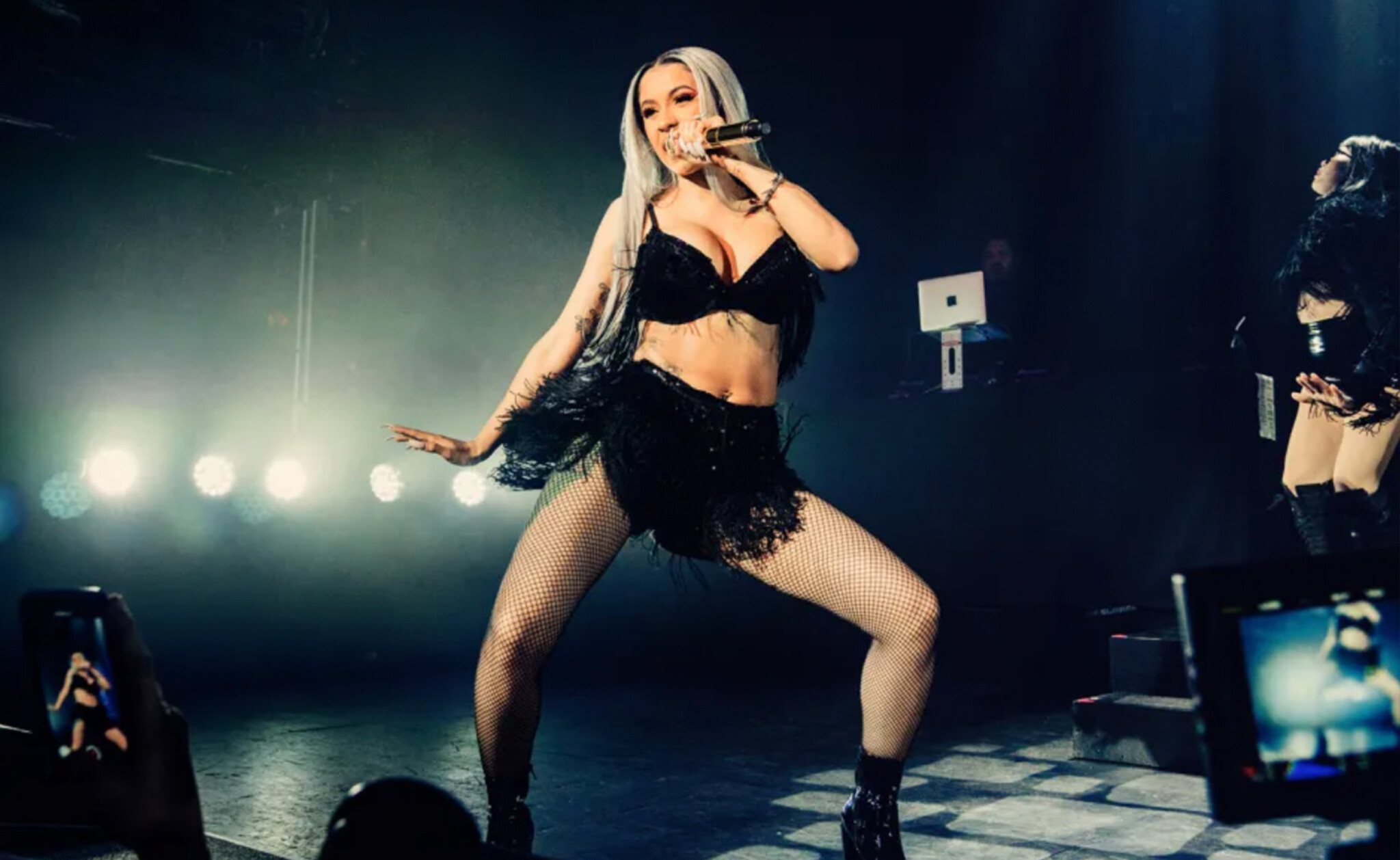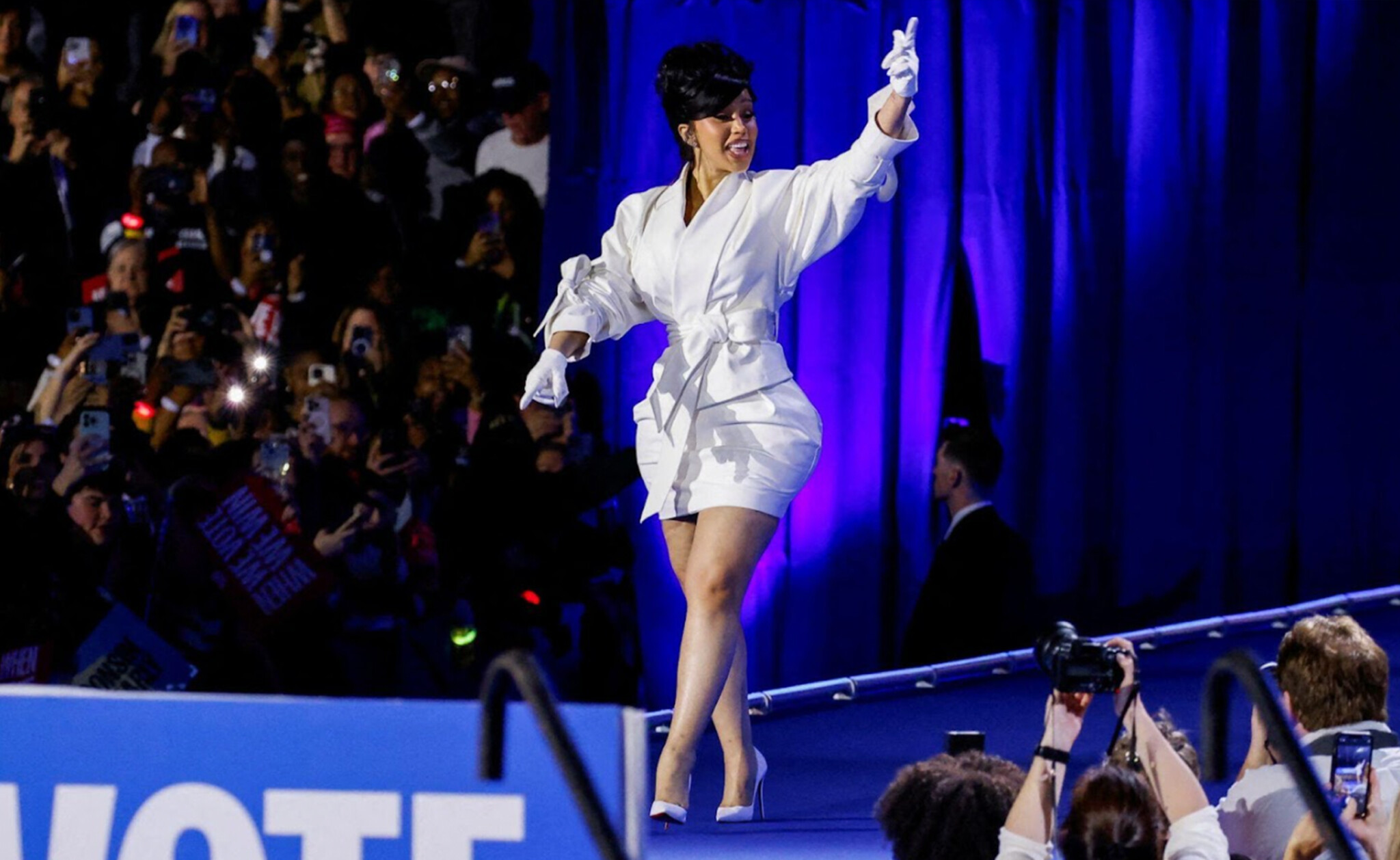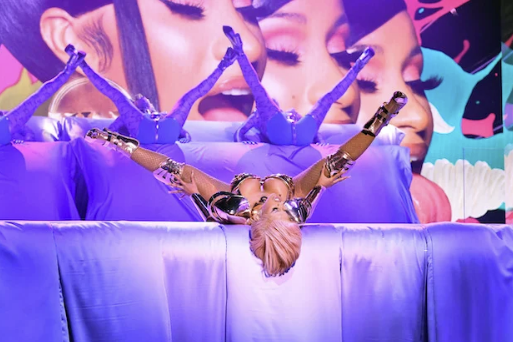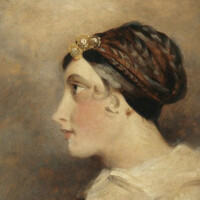
On Friday 1 November, Kamala Harris was joined at her Wisconsin rally and publicly endorsed by a figure whose political opinions she seems to hold in high regard: Cardi B, former stripper with a criminal record who now makes millions off rapping about her “wet-ass pussy” while gyrating semi-naked and calling herself a “whore”. (The sexually explicit “WAP” video can be found here. Other hits include “Cheap Ass Weave” and “I Like It” – roll over, Beethoven.) As Cardi put it delicately in a 2020 interview with Billboard, “I’m just a naughty girl, and I’m not hurting nobody because I love my pussy and want to rap about it.” Does Kamala Harris really think that such an endorsement is appropriate for a presidential candidate? The Democrat election campaign is turning into a nightmarish adult X Factor, but with global consequences.

Photograph: Reuters
Cardi B’s public address took place at Wisconsin State Fair Park in Milwaukee and can be watched on Kamala’s YouTube channel.
The rapper struts onstage to the beat of her track “Bodak Yellow”, the obscenities blanked out as if to render the song suitable for the occasion:
Said lil b*tch, you can’t f**k with me if you wanted to
These expensive, these is red bottoms, these is bloody shoes
Hit the store, I can get ’em both, I don’t wanna choose
And I’m quick, cut a n*gga off, so don’t get comfortable,
Look I don’t dance now, I make money moves.
After this distinctly unpresidential prelude, the speech gets off to an awkward start with the teleprompter failing to load the pre-prepared text. For about ninety seconds Cardi stammers, tries to entertain the crowd, and calls for technical assistance, unable to utter a word about Kamala without a script. As Joey Mannarino remarks, it appears that “Cardi has no idea what she’s even endorsing Kamala for”. At last someone hands her a phone with the speech.
It is delivered with a certain unhinged conviction, but it is high on emotion and low on meaningful content. “Just like Kamala Harris, I too have been the underdog” (the parallel is elusive); “women have to work ten times harder and perform ten times better and still our success comes with excuses”.

Performing “ten times better”
Photograph: Kevin Winter
“I wasn’t going to vote this year — I wasn’t,” Cardi admits, “But Kamala Harris joining the race, she changed my mind completely. I did not have faith on [sic] any candidate until she joined the race.” Admitting to a state of political indifference will hardly invite trust in Cardi’s newly formed opinions. It shows that she cares more about figureheads than policy. Kamala’s campaign leans heavily on Biden’s policy framework, after all, so why didn’t Cardi have a shred of “faith” before? As The Elcano Royal Institute elaborates:
[Kamala Harris] draws significantly from Biden’s policy framework, though she has strategically adjusted the political and policy messages to energise the Democratic base, address the campaign’s weaknesses and win over critical voter demographics [….] Harris has thus far been generally reluctant to detail her policy platform.
Cardi claimed she would “never turn Republican” in June, despite her outspoken criticisms of Biden. In the May cover story of Rolling Stone, she condemned Biden for his approach to the Israel-Hamas war as well as to the economy. As she eloquently put it, referring to Biden and Trump, “I don’t f**k with both of y’all n*ggas”. This marked a sea change from 2020, when she even interviewed and endorsed Biden for Elle. Perhaps this has something to do the fact that Kamala is the first mixed-race woman to run for presidency, or perhaps it is to do with her so-called “vibes” (Freddy Gray of the Spectator interviewed Democrats at the DNC, asking the question “Is Kamala Harris more ‘vibes’ than policy”, and the results are telling). Kamala is also more outspoken about abortion, whereas Joe Biden is prone to fumble the Democrat line.
Back to the perplexing rally speech. In a repetitious crescendo, Cardi praises Kamala: “She’s passionate, she’s compassionate, she shows empathy, and most of all, she’s not delusional”. The rapper skates over a few more concrete details such as the price of groceries, housing assistance, and tax cuts, before circling back to the question of female empowerment (“abortion” isn’t mentioned explicitly but it is implied). She refers to Trump as a “bully” who doesn’t “believe women deserve rights”, claiming, “he said he’s gonna protect women whether they like it or not […] If his definition of protection is not the freedom of choice then I don’t want it”.
Cardi B is the latest in a series of celebrities who have supported Kamala on her presidential campaign leading up to the election this week. These include Jennifer Lopez, who addressed the crowd at Las Vegas on Thursday 31 October, as well Kelly Rowland and Beyoncé, who both spoke at the rally at Houston, Texas on Friday 25 October. Bruce Springsteen also released a campaign-funded video pledging his support. Sky News provides a useful breakdown of various celebrity endorsements, both for Kamala (a star-studded Hollywood cast) and Trump (an assortment of figures such as Elon Musk, Hulk Hogan, Mel Gibson, Jon Voight, and Jake Paul).
Megan Thee Stallion set the tone by performing at Kamala’s first rally as the Democratic presidential nominee on 30 July at the Georgia State Convocation Center, Atlanta. Megan, Cardi B’s “WAP” partner-in-crime, who has produced similarly explicit content herself, came out in strident support of Harris and coined the term “Hotties for Harris”. “Make some noise for Ms. Harris, our future president […] Let’s get this done, Atlanta!” the rapper cried before her set. “We [sic] about to make history with the first female president, the first Black female president. Let’s get this done, hotties. Hotties for Harris!” She also released a TikTok with Kamala Harris before the show.
Some outlets such as Rolling Stone claimed gleefully that “Conservatives are melting down over Megan Thee Stallion’s ‘Hotties for Harris’ Performance”, arguing that she “enraged misogynoir-spewing conservatives”. (“Misogynoir”, a new word for me, apparently refers to the combination of misogyny and anti-black racism.) The Young Turks similarly gloated “Right-wingers CRY Over Megan Thee Stallion Rally Performance”. This is fanciful. The performance was comically inappropriate for a political launch, including explicit lyrics and tasteless dancing. I felt embarrassed watching it. What has this to do with “misogynoir”? It is a normal response to watching hip-thrusting women spout degrading lyrics at a political rally and advocate for “real hot girls” to “love their bodies” (in this context, this means having limitless unprotected sex and aborting their babies whenever they like). The flippancy is jarring given the gravity of the subject matter.
The performance begins with the chorus of “Girls in the Hood”:
I’m a hot girl, I do hot sh*t,
Spend his income on my outfit
I don’t text quick ’cause I ain’t thirty
These bitches mad, mad, they wanna hurt me.
Off to a horrendously crass start – clearly an attempt to establish strong female energy, even while denigrating “bitches” over the age of thirty and locating women’s value in being “hot” and fleecing men of their salaries. The performance has a brief recap of “Mamushi”, “Body” (not included in the clip – the full rally can be found here), and “Savage”:
I’m a savage
Classy, bougie, ratchet,
Sassy, moody, nasty
Acting stupid, what’s happening? B*tch.
I struggle to believe this isn’t a joke. Is this the official image Democrats want? The rap is punctuated by a spoken interlude intended to rouse the crowd:
If you love your bodies, you know who to vote for […] Now I know my ladies in the crowd love their bodies, real hot girls, and if you want to keep loving your bodies, you know who to vote for.
Once again, we are back to the Democrats’ obsession with women “loving [their] bodies”. Their campaign has been dominated by questions about women’s rights, although ironically many cannot define what a “woman” is. Abortion, in particular, has become a hot-button issue. Dressed up as unassailable “reproductive rights” or “healthcare”, Democrats have made late-termination abortion synonymous with women’s “freedom to choose”. Kamala’s celebrity troops have made this clear and have spoken about very little else. They fail to go into detail about abortion but sell it as something that is universally positive for baby, mother, and society. Kelly Rowland criticised Republicans who “deny the right for women to make our own decisions about our bodies”, for example, while Beyoncé claimed that she was present at the rally as a mother:
a mother who cares deeply about the world my children and all of our children live in, a world where we have the freedom to control our bodies, a world where we’re not divided.
And, of course, Cardi B and Megan Thee Stallion emphasised the importance of “choice” and “freedom”: those seductive terms which skate over the reality of abortion.
According to an article titled “Kamala Harris is running on vibes” by Charlie McCann of The Economist, the Democratic National Convention of August made it clear that abortion was key in Kamala’s campaign. But it was also a matter of joy; to be danced to, even. McCann describes scenes at the DNC:
“If you like sex, make some noise,” bellowed the DJ, who stood in front of a gigantic screen that displayed images of Vice-President Kamala Harris dancing. “Because in this election we are not going to lose the right to have an abortion…and to have sex with whoever we want.”
In a repellent twist, a major ethical issue has become nothing more than what Megan called “hot girl sh*t”. It has been painted as fun and sexually liberated. Liking sex has nothing to do with abortion. Plenty of pro-life men and women love sex.
Enjoy independent, ad-free journalism - delivered to your inbox each week
While many celebrities cast Republicans as nefarious misogynists who are out to oppress women by controlling their reproductive cycles, most pro-life Republicans don’t want to take away women’s rights; they want to protect unborn children. They show deep concern about the value of human life. To show videos of Kamala dancing while urging the crowd to “make some noise” about abortion leaves a bad taste in the mouth.
Similar tactics were used in the lead up to the 2020 election, and possibly more so in 2016, when Hillary Clinton went head-to-head with Donald Trump. Actress Olivia Wilde shot a video for “Vote Your Future”, which typifies the obfuscating tone:
“This election cycle I’m thinking about reproductive rights […] to be able to decide exactly how and when and why and where I want to have a baby”. This is “a basic human right” according to Olivia, who was heavily pregnant herself at the time of filming. Is she talking about victims of human trafficking or rape here, perhaps? Or women who suffer from ectopic pregnancies and life-threatening miscarriages? No, simply anyone who has unprotected sex. It is as if women roll out of bed one day and find themselves unaccountably pregnant, unable to choose “how and when and why and where” to have a baby – and in some obscure way, this is all the government’s fault. The responsibility is shifted. Abortion is presented as a harmless solution in the face of inconvenience, with zero mention of ethical concerns about human life or the psychological complications for the mother. By parroting terms such as “reproductive freedom”, politicians and celebrities gloss over the truth.
***
So what is the upshot of these celebrity endorsements? In August this year, Harvard produced an in-depth report titled “Celebrities Strengthening Our Culture of Democracy: A Study on the Impact of Celebrity Engagement on Civic Participation”. The brief is outlined here and the full study can be read here. The report is positive and emphasises the importance of voter turnout, citing largely Democrat influence. The author, Ashley Spillane prefaces the report:
First and foremost, I would like to thank every celebrity who has used their voice, platform, and reach to drive greater voter engagement in our democracy—and especially those who contributed to the historic voter turnout in recent years. You are an integral part of making our democracy better.
She continues: “We found that celebrity political action is informed by both a personal commitment to specific issues (or to our democracy itself) and a careful consideration of the potential impact on their brand.” Of course, it is worth bearing in mind that celebrities are often paid for endorsements and gather more fame in the process.
Celebrities certainly boost political engagement; we saw this in action in the “Swift effect”. Taylor Swift endorsed the Harris campaign in September, tweeting to her then 283 million followers: “I’m voting for @kamalaharris because she fights for the rights and causes I believe need a warrior to champion them”. As a result of this tweet, 406,000 people clicked her link to Vote.gov, the US voter information site, in just 24 hours.
But the jury’s out on whether this will determine the outcome of the election. The Guardian reports in an article of 2 November:
For general elections, celebrity effect remains difficult to quantify, and more or less minor. According to a recent YouGov survey, only 11% of Americans report that a celebrity has caused them to reconsider their stance on a political issue, and only 7% say an endorsement has led them to vote for a certain candidate. Democrats are far more likely to say that celebrities weighing in on politics helps democracy, though still less than half of them do – 41% compared with 12% for independents and 7% for Republicans.
Another article makes the perceptive point that Kamala’s high-profile celebrity support may be double-edged: “endorsements may gin up enthusiasm among a star’s fanbase, but they also play into Republicans’ arguments that Democrats are the party of the coastal elites […] It also gives the impression of desperation”.
We wait with bated breath.




Comments (0)
Only supporting or founding members can comment on our articles.